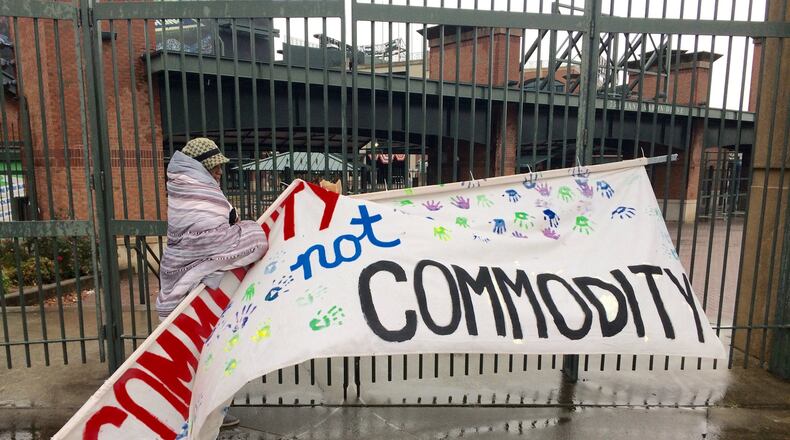A group of residents near Turner Field have set up camp next to the stadium, saying they won’t leave until Georgia State University and their development team sign a legal agreement to address gentrification and other issues that could result from redevelopment in the area.
But Georgia State President Mark Becker said Monday the demonstrators are pulling “a publicity stunt,” and that the university and its partners are working in good faith with neighborhood leaders to address a number of development concerns.
Scott Taylor, president of lead development partner Carter, said talks with a group of community leaders have been in progress for nearly two years, on matters including zoning, infrastructure, minority-owned business-participation and other issues.
The “tent city” outside the northeast gate at Turner Field is an escalation by a different group aligned with the Housing Justice League, an advocacy organization that has called for more aggressive steps to deal with gentrification and a lack of affordable housing.
On Saturday, after a march from the Mechanicsville neighborhood, residents pitched tents outside the ballpark. About two dozen slept outside overnight Sunday and Monday, participants said. They also placed banners reading “Community not Commodity” and “No CBA, No Deal,” in reference to a binding “community benefits agreement.”
Georgia State and its development team acquired the ballpark and surrounding properties in January for $30 million. The redevelopment plan, if successful, promises to transform what is now acres of lonely parking lots into a mix of retail, offices, student housing, apartments and a southern extension of Georgia State's campus.
Georgia State, meanwhile, plans to convert The Ted into a football stadium and build a new baseball field where Atlanta-Fulton County Stadium used to be.
Alison Johnson stood under a blue tent outside Turner Field on Monday amid claps of thunder and the constant drumming of rain. Gusts knocked over several tents and banners.
Above Johnson, on the back of Turner Field’s main video board, a giant rendering shows what The Ted will look like as a 33,000-seat Panthers football stadium.
“We want to say that it’s time the impacted residents around the redevelopment are included in the process of the redevelopment,” said Johnson, a longtime Peoplestown resident. “If this development is not led by us it’s not going to be for us.”
She said residents have heard promises for decades and want a legal agreement.
Becker said the university can’t enter into one. It also is legally barred from providing funding or services without value in return.
Taylor said the developers and neighborhood leaders are working on a document outlining how both sides will “advocate and plan” for infrastructure and transportation improvements, as well as parks, green space, workforce training and workforce housing.
“We will also be proposing specific strategies to offset or reduce the property tax burden on long-term residents,” he said.
One area of discussion has been the creation of a non-profit oversight organization, possibly like the Westside Future Fund, which was established to steer redevelopment near Mercedes-Benz Stadium and guard against displacement.
Taylor said Atlanta City Councilwoman Carla Smith is expected to hold a community meeting soon about what he called a “community investment plan” that has emerged from negotiations.
Taylor said protests outside Turner Field “have not increased or decreased our motivation whatsoever.”
About the Author
Keep Reading
The Latest
Featured






